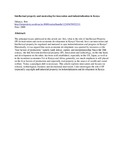| dc.description.abstract | The principal issues addressed in this article are: first, what is the role of intellectual Property (IP) in innovation and socio-economic development in Kenya? Second, how can innovation and Intellectual property be regulated and nurtured to spur industrialization and progress in Kenya? Historically, it was argued that socio-economic development was spurred by resources or the ''four factors of production,'' namely land, labour, capital, and entrepreneurship.'Since the 20th century, the link between intellectual property (IP), innovation and technology, on the one hand, and development on the other, has been well established, especially in the US, Japan, as well as in the transition economies.Yet in Kenya and Africa generally, too much emphasis is still placed on the four factors of production and especially real property as the source of wealth and social welfare. Today a paradigm shift is necessary. This article explores innovation and focuses on cultural, technological, business and institutional innovation. I also interrogate the role of IP (especially copyright and industrial property) in industrialization and development in Kenya | en |

